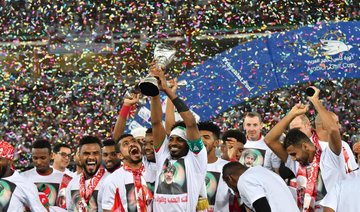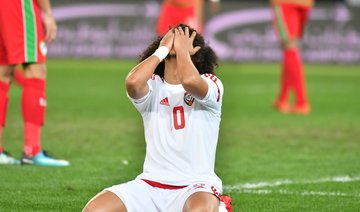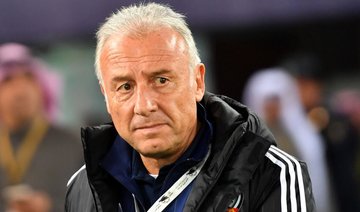DUBAI: It was easily the worst day of Omar Abdulrahman’s career.
The UAE’s star man has enjoyed a charmed few years, winning titles with his club Al Ain, garnering international acclaim for his performances with his country and, last year, being officially recognized as Asia’s finest player.
On Friday it all went wrong at the Gulf Cup final; a 90th minute penalty miss let Oman off the hook when triumph was agonizingly within reach, before another spotkick failure gave the Sultanate the title.
Even in bad times, Abdulrahman remains the center of attention.
Now he finds himself at a forked road in his career.
Rumours of, or calls for, a big move abroad, are never far away, in good times and bad. Yesterday’s disappointment and the criticism that he is already attracting, could just be the nudge needed for him to seek a new challenge.
That the man fans affectionately call “Amoory” has carried club and country for several years now is beyond debate. Time and again he has come to the rescue when they needed him most.
It should not be overlooked that, under what would have been intense pressure, he was the one player who stepped up to take the last minute penalty on Friday. Nor that, having missed it, he had the mental fortitude to volunteer for what ended up being a decisive penalty in the shootout.
Abdulrahman looked like a broken man after the UAE’s first ever defeat in Gulf Cup final. Snapping at supporters is not what we’ve come to expect from the happy-go-lucky talisman.
So where to now for the golden boy?
In the short term, it is certain that Al Ain will provide all the support and encouragement he needs, and he has shown in the past that he is a strong enough character to overcome this setback.
But looking ahead, tough decisions will need to be taken regarding his career. At 26, the window for any move abroad is closing fast. It could be argued that Omar has done all that is humanly possibly for his club and country, and he is now in danger of getting himself into a rut.
The responsibility of carrying both teams is starting to take its toll, and it will be interesting to see how he reacts to his Gulf Cup final misery next time he takes to the pitch.
A break from the fishbowl existence of the Arabian Gulf League, and indeed Asian football, could be just what is needed, in one swoop wiping the slate clean and finally fulfilling a long-held ambition.
Even a short-term loan spell could do the trick.
In the long term, Abdulrahman, indeed everyone connected with the UAE national team, will already be looking toward the 2019 AFC Asian Cup set to be held on home soil. Amoory will, regardless of what happens between now and then, still be the UAE’s trump card, so a confidence-boosting spell abroad could do wonders for player and team.
Today, the Emirati golden boy will not want to face the world, but there is no time for self-pity. The truth is that the UAE simply cannot do without Omar Abdulrahman.
CAREER TIMELINE
 Catches the eye at 2012 Olympic Games
Catches the eye at 2012 Olympic Games
A young Omar Abdulrahman catches the eye with some splendid performances against Uruguay, Team Great Britain and Senegal, prompting even Premier League players to tweet about his quality.
Leads the UAE to the 2013 Gulf Cup
Abdulrahman is player of the tournament as the UAE grab their second Gulf Cup title in Manama, Bahrain. Wearing No21, he scores a brilliant solo goal to open the scoring as the UAE beat Iraq 2-1 in the final.
Stars at 2015 AFC Asian Cup
Firmly established as his country’s star player, Abdulrahman is in the form of his life in Australia as the UAE reach the semifinal before finishing third. Provides one of the moments of the tournament with nerveless Panenka penalty in the quarter-final penalty shootout win over Japan.
Named 2016 Asian Player of the Year
Having won the Arabian Gulf League title with Al Ain and reached the final of the AFC Champions League – only to lose to Jeonbuk Hyundai Motors — Abdulrahman is crowned the continent’s best player.
 Bitter disappointment at 2018 Gulf Cup Final
Bitter disappointment at 2018 Gulf Cup Final
Two missed penalties, one in the 90th minute and another in the deciding shootout, hand Oman the Gulf Cup for the second time in their history. A dejected Abdulrahman experiences arguably the biggest disappointment of his career.

































